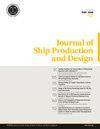基于LEAP的化学品油轮能量系统分析与建模
IF 0.5
4区 工程技术
Q4 ENGINEERING, MARINE
引用次数: 3
摘要
在其他运输方式中,海运是一种具有成本效益的选择。与此同时,由于全球经济的扩张,这种需求也在日益增加。船舶是世界上最重要的运输和贸易工具之一;全球90%的贸易是通过海上运输进行的,该部门在气候变化和全球变暖方面发挥着至关重要的作用,因为它是导致主要温室气体(GHG)二氧化碳排放的关键部门之一。在导致二氧化碳排放的其他部门,即能源生产、制造业和住宅供暖,能源效率得到了提高,排放量大大减少。但是,运输部门没有出现净减少;尽管效率有所提高,但由于货运和客运的持续增长,二氧化碳总排放量也有所增加。提高船舶的能源效率可以减少燃料消耗和温室气体排放。本研究利用广泛应用于能源政策分析和气候变化减缓评估的长期能源替代规划系统,对某化学品油轮的能源系统进行了分析和建模,包括综合能源流程图,即参考能源系统。开发了一个基本方案,并且船舶能源系统便于在技术、经济和环境方面进行分析和评估,包括低排放发展战略,以符合国际海事组织的船用发动机法规。本文章由计算机程序翻译,如有差异,请以英文原文为准。
Analysis and Modeling the Energy System of a Chemical Tanker by LEAP
Maritime transportation has been a cost-effective option among other transport modes. Meanwhile, this demand has been increasing day by day because of the expanding global economy. The ships are one of the most important transport and trade vehicles in the world; 90% of the world trade is carried out by maritime transport, and this sector plays a crucial role in climate change and global warming because it is one of the key sectors leading to emissions of carbon dioxide, the main greenhouse gas (GHG). In other sectors that lead to CO2 emissions, i.e., energy production, manufacturing industry, and heating in residences, energy efficiency has been improved and emissions have been reduced significantly. However, there has been no net reduction in the transport sector; total CO2 emissions have also increased because of the continuous increase in freight and passenger traffic, although efficiency has increased. Increasing the energy efficiency of a ship allows for fuel consumption reduction and GHG emissions. In this study, the energy system of a chemical tanker ship was analyzed and then modeled by using the long-range energy alternatives planning system, a widely used platform for energy policy analysis and climate change mitigation assessment, including a comprehensive energy flow diagram, namely, reference energy system. A base scenario was developed, and the ship’s energy system was convenient to be analyzed and evaluated in terms of technical, economic, and environmental aspects, including low-emission development strategies, to comply with marine engine regulations of the International Maritime Organization.
求助全文
通过发布文献求助,成功后即可免费获取论文全文。
去求助
来源期刊

Journal of Ship Production and Design
ENGINEERING, MARINE-
CiteScore
1.10
自引率
0.00%
发文量
19
期刊介绍:
Original and timely technical papers addressing problems of shipyard techniques and production of merchant and naval ships appear in this quarterly publication. Since its inception, the Journal of Ship Production and Design (formerly the Journal of Ship Production) has been a forum for peer-reviewed, professionally edited papers from academic and industry sources. As such it has influenced the worldwide development of ship production engineering as a fully qualified professional discipline. The expanded scope seeks papers in additional areas, specifically ship design, including design for production, plus other marine technology topics, such as ship operations, shipping economics, and safety. Each issue contains a well-rounded selection of technical papers relevant to marine professionals.
 求助内容:
求助内容: 应助结果提醒方式:
应助结果提醒方式:


